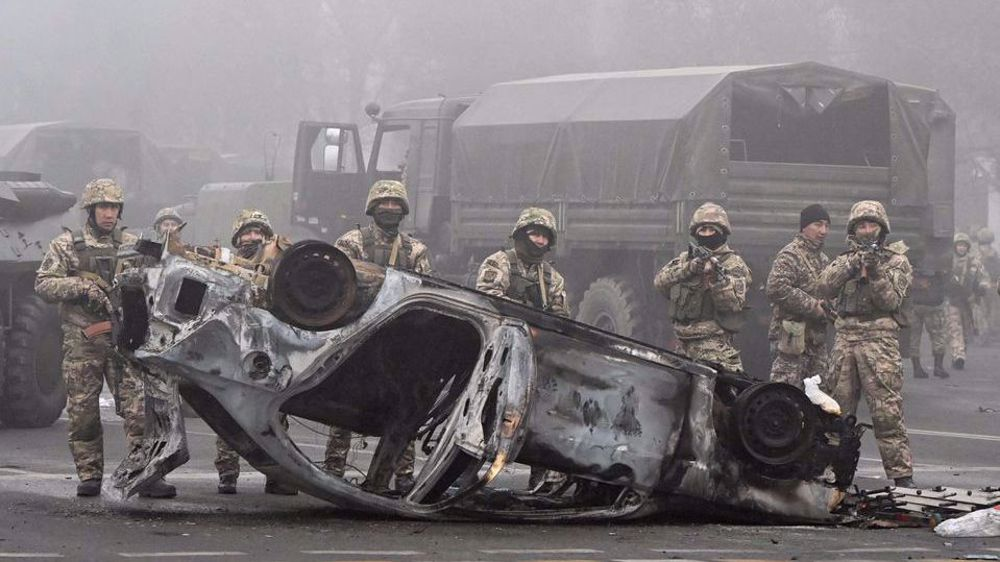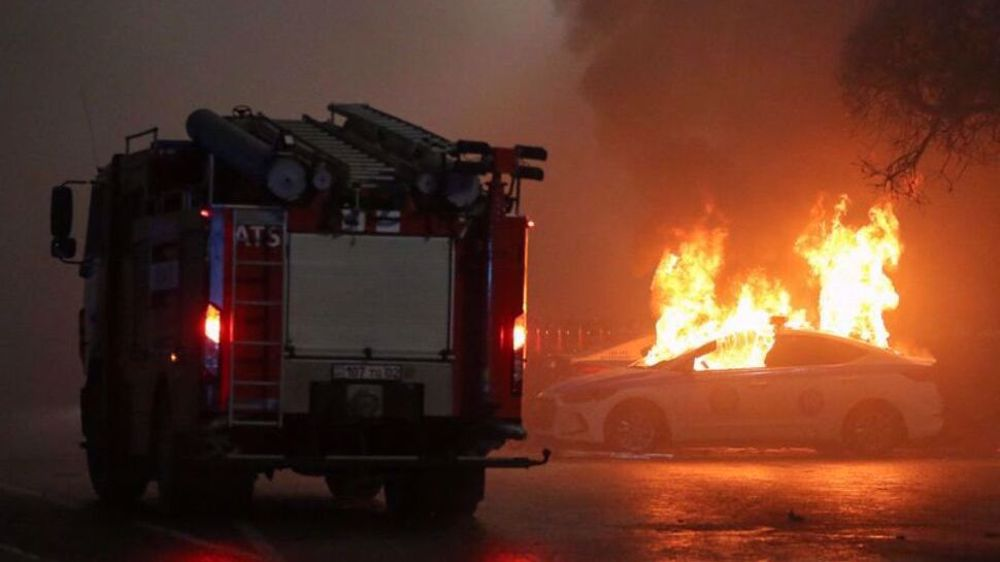
Clashes between protesters and security forces have left dozens killed while about 2,000 have been arrested in Kazakhstan’s biggest city, Almaty, as nationwide protests continue over fuel price hikes in the oil-rich Central Asian country.
Police spokesman Saltanat Azirbek said on Thursday that tens of rioters had been “eliminated” overnight in Kazakhstan’s financial capital as they tried to storm government buildings.
"Last night, extremist forces tried to assault administrative buildings, the Almaty city police department, as well as local police commissariats. Dozens of assailants were eliminated," local media quoted him as saying.Police in Kazakhstan’s largest city Almaty said Thursday they had detained some 2,000 people in connection with ongoing mass unrest.
“Almaty police have moved forward to clear the streets… In total, about 2,000 people have been brought in,” the Interior Ministry said in a statement carried by Russian news agencies.
Protesters also stormed the mayor’s office in the city, with videos on social media showing a plume of smoke rising from the building.
Almaty’s police chief, Kanat Taimerdenov, blamed the unrest on “extremists and radicals,” saying the protesters had assaulted 500 civilians and ransacked hundreds of businesses.
Meanwhile, there were reports of renewed clashes between riot police and hundreds of anti-government protesters who had gathered in the city’s main square on Thursday morning. Several armored personnel carriers and dozens of troops entered the square, with gunshots being heard as troops approached the crowd.
There had also been intense clashes between security forces and protesters on Tuesday, with police firing tear gas and stun grenades to disperse crowds of thousands of people who had gathered in the city’s main square, as protesters toppled, smashed, and set police cars alight.
Mass protests began in Kazakhstan’s western Mangistau Province on Sunday after the government decided to lift price controls on liquefied petroleum gas (LPG) — a move that roughly doubled gas prices in a matter of days. Protests then engulfed other parts of the country.
On Wednesday, Kazakh President Kassym-Jomart Tokayev declared a two-week state of emergency, including a curfew, movement restrictions, and a ban on mass gatherings, in Almaty and Mangistau.
Kazakhstan government resigns amid mass protests over fuel price hike

Later in the day, he accepted the government’s resignation and appointed Alikhan Smailov as acting prime minister. He also ordered the acting cabinet members and provincial governors to restore LPG price controls and broaden them to gasoline, diesel, and other “socially important” consumer goods.
The ongoing unrest has left at least 12 security forces dead and 353 others injured during the past days, according to media reports. Kazakhstan’s Khabar 24 news channel reported the toll as of mid-Thursday, saying that the body of one of the dead security officers had been found with its head cut off.
The escalating unrest prompted Tokayev to appeal for help from the Collective Security Treaty Organization (CSTO) — a military alliance made up of Russia and five other former Soviet states — to quell the protests. He also accused foreign-trained “terrorist groups” of being behind the unrest.
“Today I appealed to the heads of CSTO states to assist Kazakhstan in overcoming this terrorist threat,” Tokayev said in a televised speech in the early hours of Thursday. “In fact, this is no longer a threat. It is undermining the integrity of the state.”
The Moscow-led CSTO military alliance said it had dispatched its first troops, including Russian paratroopers and military units from other member states, namely Belarus, Armenia, Kazakhstan, Kyrgyzstan, and Tajikistan.
“Peacekeeping forces… were sent to the Republic of Kazakhstan for a limited time to stabilize and normalize the situation,” the CSTO said in a statement, without specifying the number of the troops involved.
Kazakhstan is a major energy power, among the top exporters of oil globally and in the leading 20 for gas. The country’s government has subsidized liquefied petroleum gas for years, but when it lifted price controls on LPG, it argued that keeping them in place was no longer sustainable.
The latest protests shook the country’s image as a politically stable and tightly controlled nation — an image it has used to attract hundreds of billions of dollars in foreign investment in its oil and metals industries.
